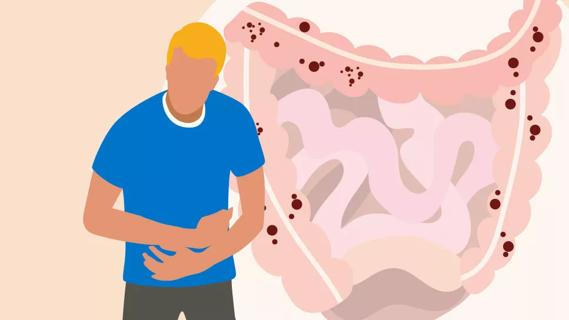Seeking help through therapy can be an important step in improving your quality of life when you have UC

Stress and ulcerative colitis (UC) go hand-in-hand.
Advertisement
Cleveland Clinic is a non-profit academic medical center. Advertising on our site helps support our mission. We do not endorse non-Cleveland Clinic products or services. Policy
When you have UC, it’s not just your physical health that’s affected. The frequent pain, unpredictability and worry that come with the inflammatory bowel disease can disrupt your emotional well-being, too.
And that stress, in turn, can make your UC symptoms even worse.
“It’s pretty well understood that, while stress doesn’t cause UC, it definitely contributes to flare-ups, and it can contribute to the first expression of UC,” says Stephen Lupe, PsyD, a clinical health psychologist who specializes in digestive diseases.
That’s why taking care of your emotional well-being is a critical part of managing your UC.
“A lot of patients get stuck in this cycle of putting their life on hold while they try to cope with the disease, and that tends to increase depression, increase anxiety and increase stress,” he explains. “But we want them to know that they can have a life and the disease at the same time. There are things that we can do to help their bodies cope with these conditions.”
Studies have found that people who have UC are more likely to develop anxiety and depression than people who don’t have the digestive condition.
“Sometimes, people who are frequently in pain or experience urgency and frequency start to become predictive of symptoms way before they ever happen, and they’ll stop doing important things in anticipation of symptoms,” Dr. Lupe notes. “Maybe they’ll stop eating or they’ll stop going out, and their lives get narrower and narrower, which a lot of times, can influence the development of anxiety or depression, which then can make symptoms worse.”
Advertisement
Sleep problems are also common in people who have UC, especially during a flare-up, he adds.
It’s important to be aware of these risks. If you’ve lost interest in doing things you used to love or are struggling with the day-to-day challenges of living with a chronic gut disorder, speak up and let your doctor know what’s going on. They’re there to help.
“Many gastroenterologists know psychologists or other behavioral health providers that they can refer patients to,” Dr. Lupe says.
If you’re already frequenting your doctor’s office, making yet another medical appointment might not be at the top of your “things I want to do” list.
But seeking help to cope with the mental and emotional aspects of the disease can be an important step in improving your quality of life and managing symptoms. Research suggests that the gut and the brain are connected through the gut-brain axis, and that stress may make symptoms worse.
“My job is to talk to patients about all of the things that come along with being diagnosed with a gut condition, whether that’s stress, anxiety or depression, or the lifestyle modifications that need to happen,” Dr. Lupe shares.
“We also look at things like body image issues, the stress and fear that can sometimes come along with having to use the bathroom frequently, and even things like talking to our partners about sexual performance after being diagnosed. We need to look at people as whole persons in order to treat the disease effectively.”
A psychologist may recommend one of these forms of therapy to help cope:
Many people find additional support in the form of online or in-real-life (IRL) support groups. “This can be very normalizing and validating to meet other people who have the same kinds of things going on in their life,” Dr. Lupe says.
But ongoing struggles with mood, stress, body image, sleep and anxiety and coping with the day-to-day challenges of living with UC should be addressed by a mental health professional.
“I think there’s a lot of stigma — and a lot of patients have fear of talking about some of this other stuff that’s going on,” Dr. Lupe recognizes. “People don’t always realize that there are things that we can do to help our bodies and minds cope so we can have a life and keep moving forward. So, make sure that you advocate for yourself and find a way to talk to someone.”
Advertisement
Advertisement
Learn more about our editorial process.
Advertisement

Chronic inflammation from flare-ups can damage the lining of your intestinal wall, making your colon more vulnerable to cancer

If you have IBD, there are roughly nine food types that might contribute to inflammation flare-ups

Vaping exposes you to thousands of chemicals, including many that are known to cause cancer and lung disease

In the world of cholesterol, HDL particles are “good” and LDL particles are “bad” for your heart health

Making lifestyle changes can help reduce your blood pressure, but taking cinnamon supplements probably isn’t one of them

Hypertension strains your heart and blood vessels, causing damage that can contribute to heart attacks

There’s usually a simple answer, like what you ate, but the color can also be a cause for concern

Sleep issues and certain foods can lead to an early morning headache

Start having sex about 72 hours before ovulation, then at least every other day during your fertile window

Attachment theory suggests that your earliest relationships shape connections throughout your life

It isn’t a recognized mental health disorder, but research shows that problematic social media use can negatively affect your mental health, self-esteem and sleep